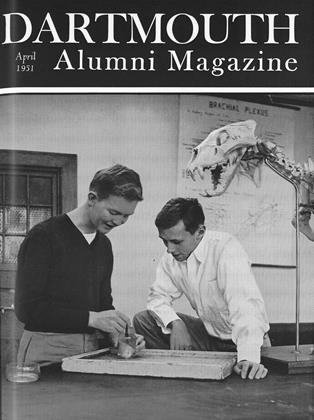Six months of intensive planning will start to bear fruit on April 1 when the Alumni Fund opens the largest campaign in its long history. Since last October, when the Alumni Fund Committee started examining the financial problems of the College to determine the amount of the Fund's objective, it has been obvious that success would demand some extraordinary efforts this year.
The amount of the objective was set at 1500,000—an amount which was judged to be well within the ability of the Fund to raise, and one which will guarantee to Dartmouth the financial ability to continue its vital work effectively. This sum, being an increase of $100,000 or 25% over last year's objective, indicated the importance of giving the class agents certain special assistance.
The size and urgency of the objective clearly indicates that the Fund will need thoughtful giving rather than token giving; the trend in that direction which has set in so strongly in recent years needs further acceleration. Usually this can best be accomplished by personal conversations, and therefore the agents this year will be making every effort to talk personally with their classmates instead of writing to them.
Since this type of approach is difficult to arrange in many western areas, the agents will have the help of regional groups in certain cities. Heading these efforts will be the following men:
Dallas, Henry C. Beck Jr. '38. Houston, David T. Hedges '34. Kansas City, Creighton C. Hart '28. Los Angeles, Edgar W. Hiestand '10. Twin Cities, Eugene J. Gluek '19. Oklahoma City, Edgar Oppenheim '39. San Diego, Richard E. Sankey '31. San Francisco, Paul F. McKown '23. St. Louis, Howard J. Mullin '27. Seattle-Tacoma, John G. Beranek '20. Spokane, Walter S. Rosenberry '30. Tulsa, John L. Ferguson '15.
These men, and their associates, will be making many personal calls in their areas, supplementing the mail contacts which agents may make. This innovation will not change in any way the key position occupied by the class agents in the Alumni Fund. It should bring a vital measure of help in an area where it is particularly difficult for the agents to do their customary thoughtful job of portraying the extent to which the educational work of the College depends on the generous interest of its alumni.
Another innovation will be a formal campaign among parents, asking them voluntarily to give some part of the difference between what they pay for their sons' education and what that education costs the College. That gap, currently measured by about $525 per student, represents the problem which the Alumni Fund has so conspicuously aided in solving, and therefore help from parents in this work seems highly appropriate and most welcome.
Parents Committee Formed
A key group of parents met in Hanover on March 10 to discuss this and other College financial problems in which parents have a legitimate interest. As a result of that meeting it was decided to form a Parents Committee within the Alumni Fund and to campaign for support. Most of the solicitation will be conducted by mail, but the enthusiasm of the sponsoring group was such that they desired to make at least a limited number of personal calls.
The major work of the Alumni Fund will again be done by the class agents and their associates—that remarkable group who have so often wrought seeming miracles for the College. Following this article you will find the names of those who have agreed to serve as this issue went to press. The lists are incomplete, but when all classes are organized the total will number about 900 men.
The real key to success lies in the hands of alumni and in their continued willingness to make thoughtful, realistic, proportionate gifts to Dartmouth—thoughtful in terms of the College's role in preserving and building a free society, realistic in terms of individual income, and proportionate to what is given for other worthy causes as well as proportionate to the fundamental importance of education as compared with such other causes.
Regional organizations and a Parents Committee are important additions as 900 Dartmouth workers undertake to raise $500,000, the largestobjective in Alumni Fund history.
EXECUTIVE SECRETARY
 View Full Issue
View Full Issue
More From This Issue
-
 Article
ArticleIt All Began in Hanover
April 1951 By FORD H. WHELDEN '25 -
 Article
Article1951 Fund Agents
April 1951 -
 Class Notes
Class Notes1918
April 1951 By ERNEST H. EARLEY, DONALD L. EARR, RICHARD A. HOLTON -
 Class Notes
Class Notes1949
April 1951 By ROBERT H. ZEISER, DAVID S. VOGELS JR., JOHN F. STOCKWELL -
 Class Notes
Class Notes1923
April 1951 By TRUMAN T. METZEL, COLIN C. STEWART 3RD, LEON H. YOUNG JR. -
 Class Notes
Class Notes1911
April 1951 By NATHANIEL G. BURLEIGH, SARGENT F. EATON, MALCOLM G. ROLLINS
GEORGE H. COLTON '35
-
 Letters to the Editor
Letters to the EditorLETTERS
DECEMBER 1958 -
 Article
ArticleThe "Secret" of Success
December 1950 By GEORGE H. COLTON '35 -
 Feature
FeatureNine-Man Council Charts Course for Development
January 1954 By GEORGE H. COLTON '35 -
 Feature
Feature"The Working of the Religious Element"
October 1954 By GEORGE H. COLTON '35 -
 Article
ArticleCorporation Support for Dartmouth
March 1955 By GEORGE H. COLTON '35 -
 Books
BooksPHILANTHROPY IN THE SHAPING OF AMERICAN HIGHER EDUCATION.
OCTOBER 1965 By GEORGE H. COLTON '35








